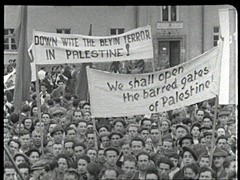<< Previous | Displaying results 1741-1750 of 6707 for "" | Next >>
-
Oranienburg camp
FilmThe Storm Troopers (SA) established the Oranienburg camp near Berlin in March 1933. The first prisoners were German political prisoners, primarily Communists and Social Democrats. Oranienburg became known for the maltreatment of inmates. Here, the Nazis attempt to undermine the charges of brutality by showing the "normal" prisoner routine. Oranienburg was gradually deactivated, closing by 1935. Most of the other early camps were also closed, to be replaced with larger camps run by the SS.
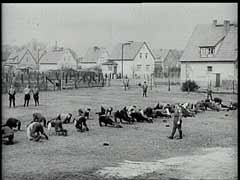
-
Jewish Brigade
FilmSoldiers of the Jewish Brigade, British Eighth Army, in the Faenza area of Italy. The Jewish Brigade took part in the final stages of the Allied offensive in Italy.
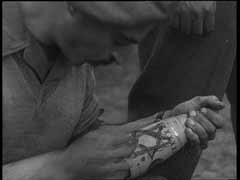
-
Training for emigration
FilmMembers of a German Zionist youth group learn farming techniques in preparation for their new lives in Palestine. Many Jewish youths in Nazi Germany participated in similar programs, hoping to escape persecution by leaving the country.
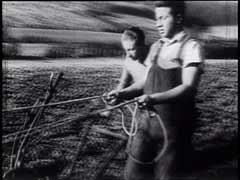
-
Liberation of Dora-Mittelbau
FilmUS forces liberated the Dora-Mittelbau (Nordhausen) concentration camp in April 1945. Here, medics and soldiers of the US 3rd Armored Division evacuate sick and dying survivors of the camp.
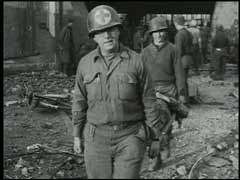
-
German air campaign in the Low Countries
FilmThe Junkers (Ju) 87, known as the "Stuka," spearheaded the Blitzkrieg ("lightning war") attacks that were decisive in the western campaign in 1940. Stuka dive-bombers closely supported German ground forces. They destroyed enemy strong points, aircraft, and airfields, and spread panic in rear areas. Although slow and easily shot down by Allied fighters, the Stukas proved devastatingly effective in the German invasions of Poland and western Europe, where Germany enjoyed superiority in the air. Stukas caused…
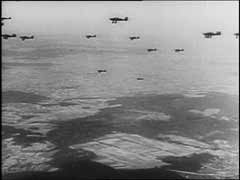
-
"St. Louis" arrives in Antwerp
FilmThe German ship SS "St. Louis" departed from Hamburg for Cuba with almost 1,000 Jewish refugees on board on May 13, 1939. Most of the passengers had Cuban landing certificates. However, the Cuban government invalidated the certificates. When the "St. Louis" reached Havana on May 27, most of its passengers were denied entry. After the United States also refused to accept the refugees, the ship returned to Europe, docking at Antwerp. Britain, France, Belgium, and the Netherlands then agreed to accept the…
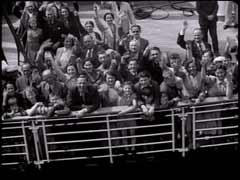
-
Prewar Romani (Gypsy) life
FilmRoma (Gypsies) celebrate with music, dancing, and singing in the mountains near Zagreb, Yugoslavia. During World War II, Roma in Yugoslavia were exterminated by Croatian nationalists and by the Germans.
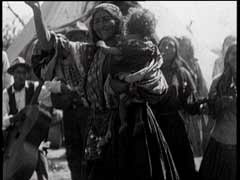
-
Refugees from the "Exodus 1947"
FilmIn July 1947, 4,500 Jewish refugees left displaced persons camps in Germany and boarded the "Exodus 1947" in France. They attempted to sail to Palestine although they did not have permission from British authorities to land. The British intercepted the ship and forcibly returned the Jewish refugees to Germany. Here, Jews from the "Exodus 1947" are confined in Poppendorf, Germany. The plight of the "Exodus" passengers became a symbol of the struggle for open Jewish emigration to Palestine.
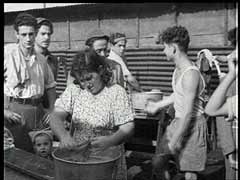
-
British soldiers deport "Exodus 1947" passengers
FilmIn July 1947 in France, 4,500 Jewish refugees from displaced persons camps in Germany boarded the "Exodus 1947" and attempted to sail (without permission to land) to Palestine, which was under British mandate. The British intercepted the ship off the coast and forced it to anchor in Haifa, where British soldiers removed the Jewish refugees. After British authorities failed to force France to accept the refugees, the refugees were returned to DP camps in Germany. The plight of the "Exodus" passengers became…
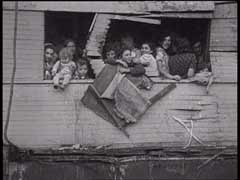
-
Protest in Bergen-Belsen displaced persons camp over return of "Exodus 1947" passengers
FilmIn July 1947, 4,500 Jewish refugees left displaced persons camps in Germany and boarded the "Exodus 1947" in France. They attempted to sail to Palestine without, however, having British permission to land. The British intercepted the ship and forcibly returned the refugees to Germany. This footage shows a protest in the Bergen-Belsen displaced persons camp in the British occupation zone of Germany. The protesters denounced British treatment of the "Exodus 1947" passengers. The plight of the "Exodus"…
